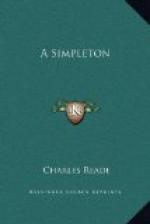It was more than he could bear. He turned savagely, and strode back to Gravesend, resolving that all this torture should end that night, one way or other.
Phoebe Dale was the daughter of a farmer in Essex, and one of the happiest young women in England till she knew Reginald Falcon, Esq.
She was reared on wholesome food, in wholesome air, and used to churn butter, make bread, cook a bit now and then, cut out and sew all her own dresses, get up her own linen, make hay, ride anything on four legs; and, for all that, was a great reader, and taught in the Sunday school to oblige the vicar; wrote a neat hand, and was a good arithmetician, kept all the house accounts and farm accounts. She was a musician, too,—not profound, but very correct. She would take her turn at the harmonium in church, and, when she was there, you never heard a wrong note in the bass, nor an inappropriate flourish, nor bad time. She could sing, too, but never would, except her part in a psalm. Her voice was a deep contralto, and she chose to be ashamed of this heavenly organ, because a pack of envious girls had giggled, and said it was like a man’s.
In short, her natural ability and the range and variety of her useful accomplishments were considerable; not that she was a prodigy; but she belonged to a small class of women in this island who are not too high to use their arms, nor too low to cultivate their minds; and, having a faculty and a habit deplorably rare amongst her sex, viz., Attention, she had profited by her miscellaneous advantages.
Her figure and face both told her breed at once: here was an old English pastoral beauty; not the round-backed, narrow-chested cottager, but the well-fed, erect rustic, with broad, full bust and massive shoulder, and arm as hard as a rock with health and constant use; a hand finely cut, though neither small nor very white, and just a little hard inside, compared with Luxury’s soft palm; a face honest, fair, and rather large than small; not beautiful, but exceedingly comely; a complexion not pink and white, but that delicately blended brickdusty color, which tints the whole cheek in fine gradation, outlasts other complexions twenty years, and beautifies the true Northern, even in old age. Gray, limpid, honest, point-blank, searching eyes; hair true nut-brown, without a shade of red or black; and a high, smooth forehead, full of sense. Across it ran one deep wrinkle that did not belong to her youth. That wrinkle was the brand of trouble, the line of agony. It had come of loving above her, yet below her, and of loving an egotist.
Three years before our tale commenced, a gentleman’s horse ran away with him, and threw him on a heap of stones by the roadside, not very far from Farmer Dale’s gate. The farmer had him taken in. The doctor said he must not be moved. He was insensible; his cheek like delicate wax; his fair hair like silk stained with blood. He became Phoebe’s patient, and, in due course, her convalescent: his pale, handsome face and fascinating manners gained one charm more from weakness; his vices were in abeyance.




